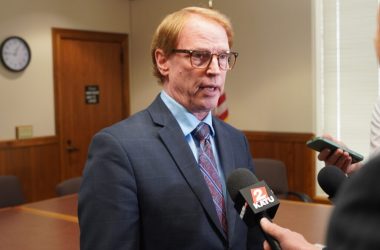 The Oregon Capitol building in Salem. Photo: Chas Hundley
The Oregon Capitol building in Salem. Photo: Chas Hundley
SALEM – House Bill 4066, a prospective law that passed on a 7-2 vote that would allow the state Public Utility Commission (PUC) to provide electric companies with the ability to recover costs for electric vehicle investments from ratepayers, passed the Oregon Legislative House Committee on Energy and Environment.
Oregon Representative E. Werner Reschke (R-Klamath Falls), a member of the legislative committee, in a press release argued that allowing the PUC to recover costs from electric vehicle investments by ratepayers would tax Oregon’s electric grid to the point where electricity would amount to nothing more than a trickle of power for some customers, though he did not specify in the press release if he meant average home consumers or small businesses, commercial and industrial operatives.
Representative Reschke argued that HB 4066, if eventually signed into law, will increase the demand for electricity while simultaneously decreasing the state’s electrical grid capacity.
Other members of the House Committee on Energy and Environment that voted in favor of HB 4066 include Rep. Ken Helm (D-Washington County), Rep. Sheri Schouten (D-Beaverton), Rep. Janeen Sollman (D-Hillsboro), Rep. Karin Power (D-Milwaukie), Rep. Andrea Salinas (D-Lake Oswego), and Rep. Marty Wilde (D-Central Lane and Linn Counties).
[Not a subscriber? Get your local news online for the next three months for just $3/month with a monthly subscription! Click here to start]
Rep. Reschke and committee vice-chair Rep. Daniel Bonham (R-The Dalles) were the only two votes against HB 4066, while their partisan colleague, Rep. David Brock Smith (R-Port Orford), crossed the aisle to vote in line with the six Democrats in favor of the bill.
“Accelerating the transition to electric vehicles is putting the cart before the horse,” Reschke said in a prepared statement. “Increasing these infrastructure expenses ignores capacity constraints on our electrical grid.”
The press release issued by Rep. Reschke states that “critics are concerned that expediting the demand (for) electricity will test the capacity of the electrical grid.”
“The Supermajority (Democrats) shows a concerning pattern of passing legislation of unintended consequences,” Reschke stated. “What happens when the grid fails? We are literally burning the bridge before we cross it while being told by the utility companies and (the) PUC that everything will be OK. That’s not good enough for Oregonians. We don’t want to end up like California with brownouts. We need an electrical grid we can rely on.”
Portland General Electric spokesperson Elizabeth Lattanner told the Banks Post that PGE always is planning for the future — under the independent oversight of the PUC, the utility provider is required to plan years in advance to ensure that it is able to meet electricity demands today and in the future.
“We use data, information from our customers, and economic projections to forecast the demand for electricity needs out years in advance,” Lattanner said. “The effects of more electric vehicles on the road are considered part of our planning process, which helps to ensure we’re ready to meet loads as demand increases over time. An increased number of electric vehicles also means that we can integrate a lot more flexible load — not only planning how to meet the demands of that load but also how it can be used to help manage the grid and integrate variable resources.”
Rep. Tiffiny Mitchell (D-Astoria), whose district — District 32 — represents Banks and Gales Creek, said she supports the bill because it is an important step in moving forward on broad-scale transportation electrification.
“While I respect the perspective of my colleagues who voted no, I disagree with their assessment,” Mitchell said. “This bill would not have moved forward without (the approval of) essential stakeholders like major electrical utilities and the (Oregon) Citizens’ Utility Board (CUB). If electrical utilities feel confident and the CUB, as the advocate of ratepayers, isn’t sounding the alarm, I don’t know what better endorsement of the legislation there is.”
House representatives Bonham and Reschke did not respond to requests for comment.
To read the entirety of HB 4066 in its current form click here.






